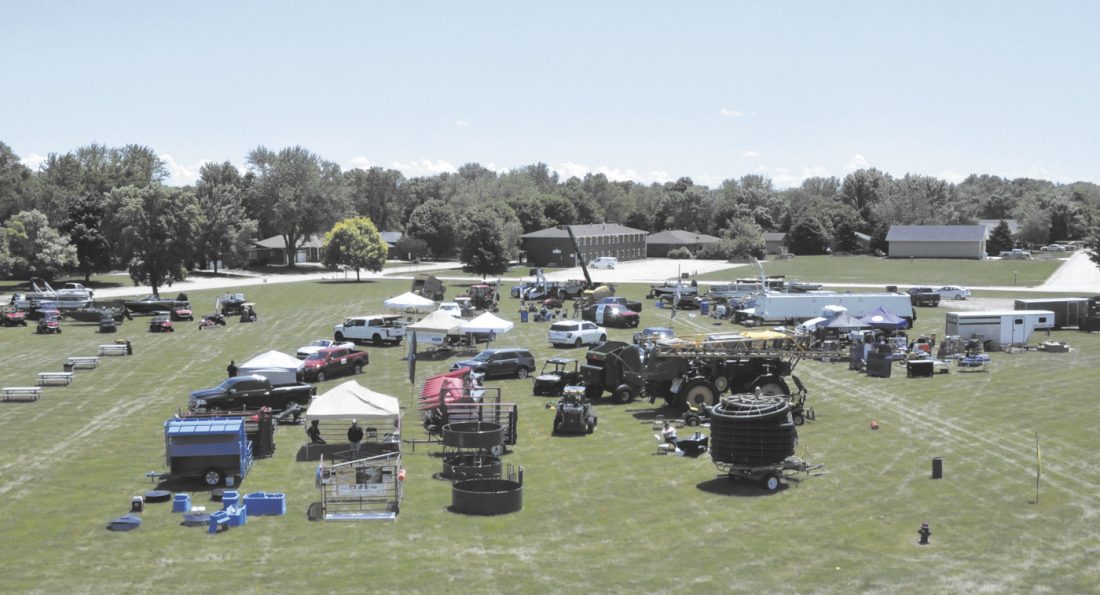Trade and weather covered at Farm News Ag Show
-
-Messenger photo by Kriss Nelson
The Farm News Ag Show featured several acres of outdoor exhibitor space in addition to an indoor exhibitor space as well.
-
-Messenger photo by Kriss Nelson
Dean Rooney, 2, of Emmetsburg, plays on an UTV that was on display at the Farm News Ag Show in Emmetsburg.
-
-Messenger photo by Kriss Nelson
The Blue Ribbon Ramblers performed during the Farm News Ag Show held Wednesday at Iowa Lakes Community College in Emmetsburg.

-Messenger photo by Kriss Nelson
The Farm News Ag Show featured several acres of outdoor exhibitor space in addition to an indoor exhibitor space as well.
EMMETSBURG — Everything agriculture and more took over the Iowa Lakes Community College Emmetsburg Campus on Wednesday for the Farm News Ag Show.
In addition to several vendors located both inside and out, show-goers also had the opportunity to listen to three agricultural experts who all touched on popular subjects impacting producers and landowners today, including the weather, trade concerns and more.
David Kruse, owner of CommStock Investments and weekly Farm News columnist, was the first speaker of the day.
According to Kruse, we are seeing a weakening in the global economy, mainly in part to the ongoing trade war the United States is fighting with China and other countries.
“And that is negative for our sector,” he said. “We have benefited from globalization. What we saw in China and many other countries where we saw peasants, that when they were able to finally get an income, the first thing they do with that income is they improve their diets. They add calories. That improves the food demand around the world and who better to fill that than us?”

-Messenger photo by Kriss Nelson
Dean Rooney, 2, of Emmetsburg, plays on an UTV that was on display at the Farm News Ag Show in Emmetsburg.
“That was our opportunity and now, we see a global contraction,” Kruse added. “That means all that process is slowing and that our market, therefore, is becoming smaller, or not growing at the rate it should so we don’t get the full benefit from that.”
Although there continues to be hope that the trade war will come to an end soon, that doesn’t appear to be the case.
“They are going to continue to talk, but China doesn’t appear to be ready to do the reforms that the president wants and it appears to be at this point they are now willing to wait for the 2020 election so nothing is likely to be resolved there,” he said. “This has had a very negative impact on our soybean market.”
Kruse said it’s becoming more than just a trade war.
“Basically, it’s a challenge between that country and ours,” he said. “Also, it’s competition in the rest of the world. The world is sort of being told they have to pick in certain ways; who do they want to align with? Who is the next supply chain to come up as a result of this? I don’t think that’s a good situation for us.”

-Messenger photo by Kriss Nelson
The Blue Ribbon Ramblers performed during the Farm News Ag Show held Wednesday at Iowa Lakes Community College in Emmetsburg.
Farmers, Kruse said, are the ones that are being hit the hardest as a result of these trade wars. And although there has been some assistance in the form of Market Facilitation Program (MFP) payments, also known as “voter seeding,” that fixes nothing.
“There is still a hole at the bottom of the bucket and everything is leaking out and we are not gaining on stuff,” he said. “We are losing ground on trade and that’s where we are losing money for the ag sector. This is going to be a problem and I guess it will be a political one.”
Looking at both major political parties, Kruse sees little hope coming from either side.
“There’s not a white knight or savior that is going to come from the other side at this point,” he said. “There are no really good ag politicians out here today that understand the whole thing and to get it right. The alternative to get excited about just doesn’t seem to exist.”
All about the weather
Elwynn Taylor, Iowa State University professor of agronomy and climatology emeritus, talked about our ever-changing climate and how the next five years or so may bring less than ideal growing conditions.
“People have been asking me if climate change is hurting agriculture in the Midwest,” Taylor said. “I always have to ask people what they mean by climate change? But yes, it is getting wetter around here and that is a blip in climate that we have and is setting new records. I don’t know when it will quit setting new records, but we do have an increase in moisture.”
He added the increase in wet conditions is no longer considered abnormal.
“We are saying this is the new weather that we have got for our area,” he said.
Although the conditions are what most consider wetter than normal, conditions may seem less than ideal for many, as having an ample amount of moisture in the ground can result in higher yields.
“Crops can use about 25 inches of water during the year,” he said. “Some people will say it takes 20 inches of water to have an average trend line crop. With 20 inches, if things weren’t too hot and stressful, it is possible to get a trend line yield. Twenty-five inches, it becomes possible to have a record high yield.”
Gleissberg Cycle
Who could imagine, after the new trend of wet weather in the state, the threat of another Dust Bowl could be possible?
Taylor discussed the Gleissberg Cycle, named for the work by Dr. Wolfgang Gleissberg, a physics professor that works with the cycle of the sun.
“A lot of people hear me talk about the Gleissberg Cycle,” Taylor said. “Dr. Gleissberg discovered the sun gets larger and smaller — it can do that, it’s a ball of gas. It doesn’t change much, but it changes and enough that it effects our weather significantly.”
Taylor said he looks at the Gleissberg Cycle as activity throughout 89 years of the sun going from its largest to the smallest.
“If I look back to the history of trees, we can go back 800 years with the oak trees in Iowa, and, we see the worse year, essentially of the century, tend to be 89 years a part,” he said.
To put it into perspective, Taylor said the worst years for crops in Iowa during the 1800s were 1846-1847. In the 1900s, the worst years for the Cornbelt were 1935-1936.
If we follow that trend, the year 2024-2025 are projected to bring conditions similar to the Dust Bowl.
“Those years back in the ’30s for Dust Bowl conditions was the harshest weather as far as crops are concerned,” he said. “I bring this up because it is on our doorsteps now.”
The condition of the state
State Secretary of Agriculture Mike Naig wrapped up the day of speakers for the Farm News Ag Show discussing several of the ag policies and issues effecting not only the state of Iowa but the United States.
“Unfortunately we are having to use words like extreme and historic when it comes to what is happening in Iowa,” he said.
Facing trade issues, Naig said getting the United States — Mexico-Canadian Agreement (USMCA) passed is an urgent necessity.
“You don’t have to have an economics degree to understand that is an important agreement for us,” Naig said. “To have zero tariffs across those borders. It is time for action. It is time for congress to pass the USMCA. It is important for U.S. agriculture. It is critically important for Iowa agriculture.”
Naig also spoke about the progress, or lack thereof when it comes to the negotiations with China.
“They took a pretty dramatic step back from the negotiating table here a few weeks ago,” he said. “We all wish this would have been taken care of 10 months ago. There is no doubt about the fact that it is hurting our markets, but we also know that the situation with China hasn’t been good for several years.”
He added it’s the non-tariff barriers China placed on U.S. products that kept our products out, as well as intellectual property theft that needs to stop.
“Those behaviors can’t continue,” Naig said. “China is the second-largest economy in the world. They are a member of the WTO (World Trade Organization). They don’t get to act this way and it’s time to get a deal done.”
“But make no mistake,” he said. “This does hurt us. Their retaliatory tariffs hurt us. We are concerned about losing market share in a very important country.”
African Swine Fever
Naig said there has been a lot of focus on foreign animal disease prevention in light of the spread of African swine fever in China and beyond.
“This is something that could have a dramatic impact on the United States and on Iowa agriculture,” he said.
Naig said China has struggled to get the spread of the virus under control.
“It is a tough virus to deal with,” he said. “There is no vaccine. It has impacted at least 40 percent of their industry and we believe those estimates are low. This is something that is a great concern to us. We need them to control the spread and we need to be vigilant. This is an ever present risk.”
Ethanol
Year-round access to E15 was recently announced and earlier this week, President Donald Trump visited an ethanol plant near Council Bluffs.
“That visit was a bookend to that announcement,” said Naig. “This is good for Iowa, it’s a good thing for U.S. agriculture. It’s great for our ethanol industry. Anything that can help that plant across town have a large market for the product it produces and need more corn is a good thing for all of us.”
But the fight for ethanol still continues, specifically with the issue of small refinery exemptions. Naig said he had an opportunity to not only speak with the president, but USDA Secretary of Agriculture Sonny Perdue and Andrew Wheeler, administrator of the Environmental Protection Agency. where he feels his concerns were heard.
“The opposition of the RFS (Renewable Fuels Standard), the opponents of ethanol and biodiesel are alive and well. They are not going away,” he said. “Iowa leads the nation in ethanol and biodiesel and as I like to say, if we are not willing to fight for us, who do we expect will?”
Naig said U.S. Sen. Charles Grassley, U.S. Sen. Joni Ernst, Gov. Kim Reynolds and his office are going to keep working together as will the entire congregational delegation.
“Republicans and Democrats are working together because we know this is so important to our state,” he said.
Naig said the RFS allows for small refineries that are experiencing economic hardship to apply for a waiver from their obligation to blend certain amounts of ethanol.
“It’s a big deal,” he said. “Over the last couple of years, the EPA has allowed over two billion gallons worth of ethanol demand out the back door. If you have a 15 billion gallon RFS in the country, but you will let two billion gallons out the back door you don’t have a 15 billion gallon standard. You have a 13 billion gallon ethanol standard and that’s not what congress told the EPA to do and we want them to do what they’re supposed to do, which is keep it at 15.”
“If you are going to allow exemption, then redistribute those gallons across the rest of the industry. Congress was told to have a 15 gallon standard. That is our next issue we really need to work on.”









